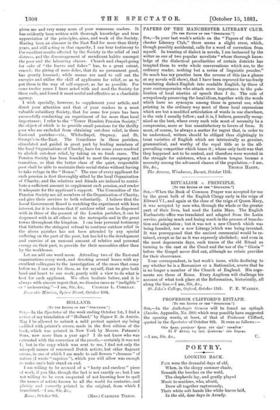RITUALISM v. PRINCIPLE.
[TO THE EDITOR OF THE "SPECTATOR."]
SIR,—When the Book of Common Prayer was accepted for use by the great bulk of the English Clergy early in the reign of Edward VI., and again at the close of the reign of Queen Mary, it was accepted by men who, through the whole or the greater part of their lives, had used the Latin Mass. The English Eucharistic office was translated and adapted from the Latin service, gaining much and losing much in the process of transla- tion and adaptation ; but it was not a new Church which was being founded, nor a new Liturgy (which was being invented. It was presupposed that the ancient ceremonial would be re- tamed, except so far as it was expressly abolished ; and even in the most degenerate days, such traces of the old Ritual as turning to the east at the Creed and the use of the " Gloria " before the Gospel never died out, although no rubric provides for their observance.
Your correspondent, in last week's issue, while declining to say whether be is a Romanizer or a Rationalist, avows that he is no longer a member of the Church of England. His argu- ments are those of Rome. Every Anglican will challenge his account of what took place at the Reformation, historically, all, along the line.—I am, Sir, &c.,
St. John's College, Oxford, October 11th. F. E. WARREN.


































 Previous page
Previous page